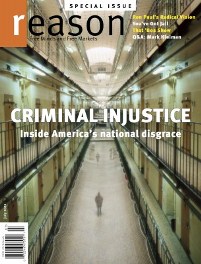
In one particularly interesting column, "The Crime Rate Puzzle," Radley Balko (recently hired away from Reason by the Huffington Post) examines what academics think about the causes for the much-touted drop in crime of recent years. "Did incarceration reduce the crime rate, or did it get in the way?"
Sam Walker, professor emeritus at the University of Nebraska and one of the top scholars of policing, tells Balko:
Conservatives say the crime drop was because of incarceration. Liberals say it was programs like community policing. I don't think there's much convincing evidence for either."
Academic consensus, according to Balko, exists for just two factors: the ebbing of the crack trade after its peak in the late 1980s, and the growth in the economy since 1992. In this understanding, part of the drop in crime is due to the previous rise having been an aberration -- the new drug crack, shorter acting and marketed in poor neighborhoods, brought in a larger number of transactions each day and new fighting over turf. When the trade restabilized and the use of crack diminished, violence went back down to more normal levels. And over the longer term, a big part of the drop in crime is the growth of the economy, leading to lower unemployment, more jobs in the licit economy, less desperation, etc. "[I]t seems that as we live better... we live better," writes Balko.
Balko's willingness to question whether imprisoning more people has really reduced crime is especially important in light of the willingness of some academics to oversimplify that very question. In a generally insightful column published last month, sociologist James Q. Wilson was willing to question how much of the drop in crime was accounted for by the increased in incarceration, and even whether some types of incarceration really do address violence, low-level drug dealers in particular. But overall it is as simple to Wilson as to say "when prisoners are kept off the street, they can attack only one another, not you or your family."
Of course it's not that simple. The prisoner kept off the street may have a younger brother who becomes embittered by his sibling's absence, and is driven to crime for that reason. The money spent to incarcerate that person might instead have funded an after-school program serving dozens of at-risk youths, possibly preventing a number of criminal careers from ever beginning. Ultimately such questions can only be answered by research. Wilson's willingness to entirely omit such questions from his discussion makes it less likely to shed light on that particular point, and it ignores research calling the assumption into question. As Balko cites:
In a series of studies published in 2009, the University of Missouri-St. Louis criminologist Richard Rosenfeld and the SUNY-Albany sociologist Steven Messner found that during the last 15 years, states with lower incarceration rates saw bigger drops in crime, on average, than those with lock-'em-up policies. Moreover, the historic increase in the prison population began in the early 1980S, a decade after the crime rate began to rise and a decade before it started to fall. The incarceration rate increased by more than 100 percent in the 1980s, but violent crime still increased that decade, by 22 percent.
Also omitted by most authors, but not Balko, is the prohibition issue. "[W]ere it not for drug prohibition, we could well be living in the safest era in American history." A good reason not to be complacent about the state of crime and the criminal justice system in America today.
This work by StoptheDrugWar.org is licensed under Creative Commons Attribution-ShareAlike 4.0 International
Add new comment